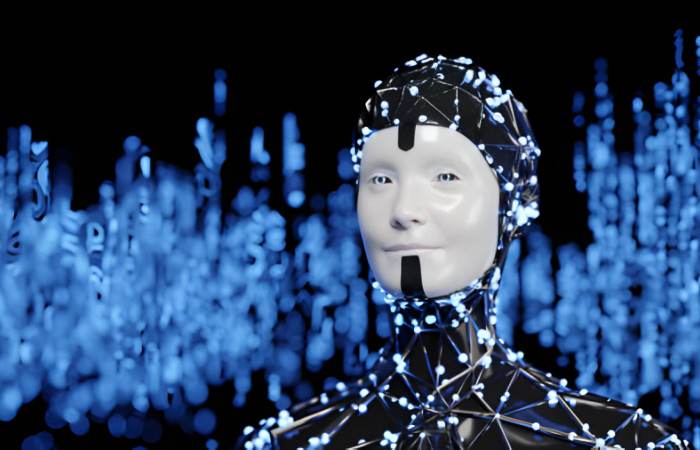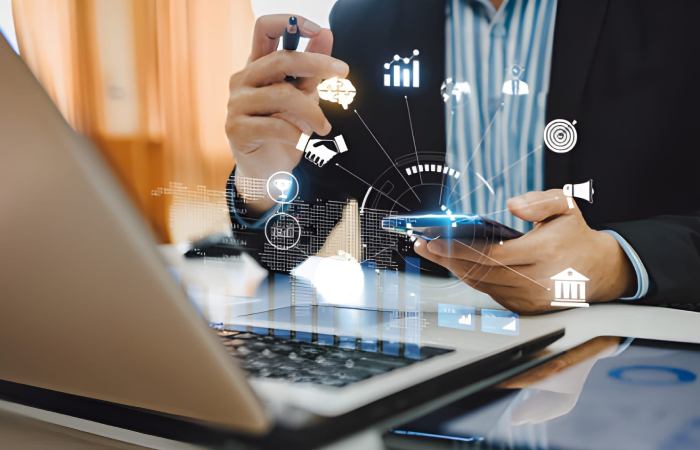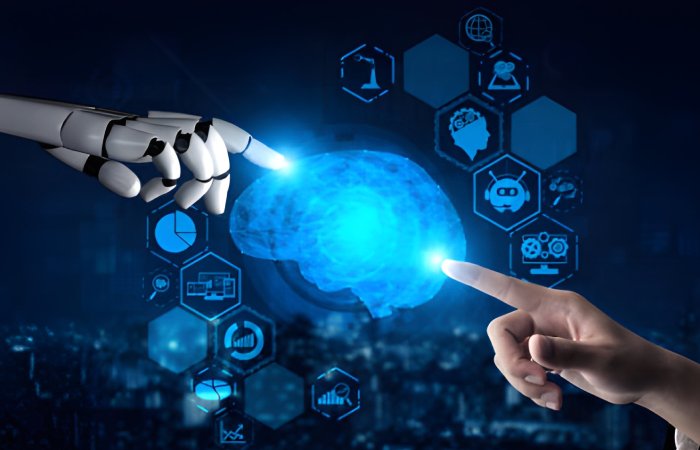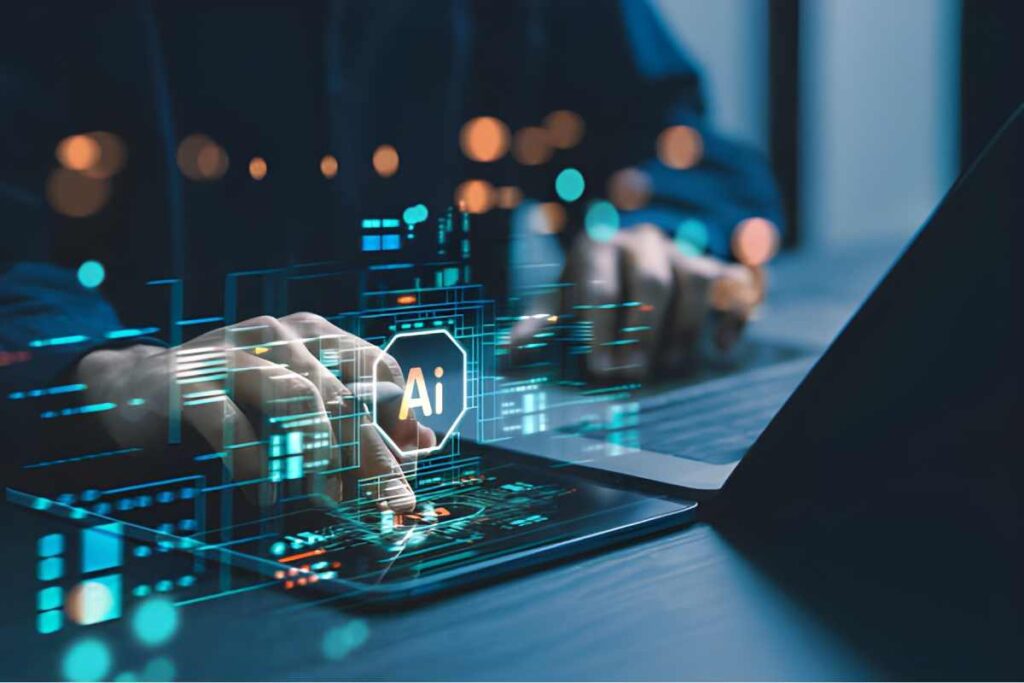The functionality and popularity of artificial intelligence are skyrocketing. Finance Artificial intelligence is the ability of a system or program to think and learn from its own experience. In recent years, AI applications have evolved significantly and have been applied in virtually every business area. This article will help you learn about the best real-world applications of artificial intelligence.
What Is Artificial Intelligence?
Artificial intelligence (AI) is a machine-like representation of intelligence that mimics human behavior or thought and can be trained to solve specific problems. AI is a mixture of machine learning and deep learning methods. AI models are skilled on massive amounts of data and can make intelligent decisions.
Importance of AI in Today’s World
AI is revolutionizing industries by automating tasks, streamlining decision-making, and driving innovation in healthcare, education, and finance, making it a key driver of progress in the digital age.
How Generative AI Has Taken AI Further

Generative AI powers applied AI by generating original content, such as text, images, and code, from user input, Unlike old-style AI. It focuses on creativity and human interaction, opening up new possibilities in art, customer service, and software development, transforming how we work and innovate.
24 Artificial Intelligence Applications
Here’s a list of the 24 best uses of AI:
1. E-Commerce
Artificial intelligence (AI) has malformed the e-commerce industry, improving the shopping experience and streamlining business operations. AI-based recommendation systems analyze purchaser behavior and partialities to suggest products, snowballing sales and customer satisfaction. Additionally, AI-based chatbots provide prompt customer service, answer questions, and guide shoppers through purchasing.
Example
Amazon uses AI to indorse products to users based on their browsing history, previous purchases, and preferences. This personalization increases engagement and sales by presentation consumers the foodstuffs they are most likely to buy.
2. Education
Another application of AI is its use in improving education. AI in education is changing the way students and teachers learn. Adaptive learning platforms use AI to personalize enlightening gratified based on each student’s strengths and weaknesses, offering a personalized approach to learning. AI can also automate administrative tasks, allowing teachers to focus more on teaching than paperwork.
Example
Another important application of AI is in educational technology, where platforms like Simplilearn use AI algorithms to provide course recommendations and personalized feedback to students, thereby improving learning quality and outcomes.
3. Lifestyle
The following common application of AI is lifestyle AI. AI is combined into various lifestyle applications, from personal helpers like Siri and Alexa to smart home devices. These technologies simplify everyday tasks, provide entertainment, schedule management, and even control household appliances, making life more comfortable and well-organized.
Example
Smart regulators like Nest use AI to learn homeowners’ temperature preferences and schedule operating modes, automatically regulating settings for optimal comfort and energy savings.
4. Navigation
AI significantly improves triangulation systems, making travel safer and more efficient. Advanced procedures process real-time traffic data, weather conditions, and driving history to provide accurate and relevant route suggestions. AI is also used in independent vehicles, which use instruments and machine learning to navigate roads and avoid obstacles.
Example:
Google Maps uses AI to analyze traffic conditions and plot the fastest routes, helping drivers save time and reduce fuel consumption.
5. Robotics
AI enhances the capabilities of robots, permitting them to achieve complex tasks with precision and efficiency. In industries like manufacturing, AI-powered robots can collaborate with humans to perform repetitive or dangerous tasks, thereby increasing productivity and safety.
Example
In the automotive industry, AI-powered robots are used for part assembly, painting, and quality control, significantly speeding up production and ensuring high product quality.
6. Natural Language Processing
Natural language meting out (NLP) is a field of artificial intelligence focusing on human-computer interactions using natural language. NLP enables machineries to understand, interpret, and generate human language, facilitating applications such as translation, sentiment analysis, and voice assistants.
Example
Grammarly uses NLP to analyze texts for grammatical errors, improve style, and offer suggestions for clarity, helping users improve their writing.
7. Computer Vision
Machine vision uses artificial intelligence to understand and process visual information from the world around us. It enables machineries to recognize objects, people, and actions in images and videos, with applications in security, healthcare, and autonomous vehicles applications.
Example
Autonomous vehicles use machine vision to detect and respond to obstacles, traffic lights, and pedestrians, ensuring safe navigation.
8. Face Recognition
Face recognition technology uses artificial intelligence to recognize and verify a person based on their facial landscapes. This technology is widely used in sanctuary systems, access control, and personal device authentication, offering a convenient and secure way to confirm identity.
Example
Apple’s Face ID technology uses facial gratitude to unlock iPhones and authorize payments, contribution a secure and convenient authentication method.
9. Human Resources
AI in HR streamlines recruitment by automating resume screening, interview scheduling, and initial candidate assessment. AI tools can analyze job descriptions and compare them to candidate profiles to find the most suitable candidate.
Example
Companies like IBM use AI-based platforms to analyze resumes and find the most suitable candidates, significantly reducing the time and effort required for the hiring process.
10. AI in Healthcare
One of the most critical applications of AI is its integration into healthcare and medicine. AI transforms healthcare by improving diagnoses, initialing action plans, and optimizing enduring care. AI algorithms can examine medical images, predict disease outbreaks, and facilitate the development of new drugs, thereby improving the overall quality of healthcare.
Example
IBM Watson Health uses AI to analyze massive amounts of medical data, helping doctors diagnose diseases and recommend personalized treatment plans.
11. Agriculture
AI-based applications help optimize agricultural practices, increase crop yields, and ensure efficient use of resources. AI-enabled drones and sensors can monitor crop health, soil, and weather conditions, providing farmers with valuable insights.
Example
Precision agriculture stages use AI to analyze data from instruments and drones, helping farmers make informed irrigation, fertilization, and pest control decisions.
12. Gaming
Another prominent application of AI is video games. AI significantly impacts the video game industry by creating a more realistic and engaging gaming experience. AI algorithms can generate intelligent conduct in non-player characters (NPCs), adapt to player actions, and improve the gaming environment.
Example
In games like “The Last of Us Part II,” AI-controlled NPCs display realistic behavior, making the gaming involvement more immersive and challenging for players.
13. Automobiles
Artificial intelligence (AI) is at the front of the automotive industry, driving advancements in autonomous driving, predictive maintenance, and onboard personal assistants. AI systems can process sensor and camera data to navigate roads, prevent collisions, and provide real-time traffic information.
Example
Tesla’s Autopilot uses AI to provide semi-autonomous driving, assisting with lane keeping, adaptive cruise control, and parking tasks.
14. Social Media
AI improves social media platforms by personalizing content feeds, identifying fake news, and increasing user appointment. AI algorithms analyze user behavior to indorse relevant posts, ads, and connections.
Example:
Facebook uses AI to personalize news feeds, showing users content that matches their interests and interaction patterns.
15. Marketing
AI in marketing helps businesses comprehend customer behavior, optimize movements, and deliver modified experiences. AI tools can examine data to identify trends, segment spectators, and automate gratified distribution.
Example:
Email marketing platforms similar Mailchimp use AI to examine customer interactions and optimize email marketing campaigns to increase engagement and conversions.
16. Chatbots
AI chatbots offer instant customer service, answering questions and helping customers resolve issues 24/7. These chatbots can handle various tasks, from simple answers to frequently asked questions to resolving complex customer service subjects.
Example
Many e-commerce websites use catboats to assist customers throughout the purchasing process, answering questions about products, orders, and returns.
17. Finance
AI in the banking and financial sectors has helped improve risk organization, fraud detection, and investment strategies. AI algorithms can analyze financial data, identify patterns, and make predictions, helping companies and persons make informed choices.
Example
Robo-advisors like Improvement use AI to provide personalized speculation advice and portfolio management, making financial planning accessible to a broader audience.
18. Astronomy
Another area of AI application is astronomy. AI helps astronomers analyze large volumes of data, identify celestial objects, and discover new phenomena. AI procedures can procedure data from telescopes and satellites, mechanizing the detection and classification of astronomical objects.
Example
NASA is using AI to analyze data from the Kepler space contract, helping to discover exoplanets by noticing subtle changes in the brightness of stars.
19. Data Security
AI improves data security by detecting and responding to cyberthreats in real time. AI systems can screen network traffic, identify suspicious activity, and automatically lessen risks.
Example:
AI-powered cybersecurity stages like Darktrace use machine learning to detect and respond to potential cyberthreats, protecting organizations from data breaches and attacks.
20. Travel and Transport
AI optimizes travel and transportation by improving route planning, traffic management, and the passenger experience. AI-powered schemes can analyze data to predict delays, optimize schedules, and provide passengers with real-time updates.
Example
Airlines use AI to forecast flight delays based on numerous factors, such as weather circumstances and air traffic, permitting them to manage schedules and keep passengers informed proactively.
21. Automotive Industry
AI is transforming the automotive industry, advancing autonomous vehicles, predictive maintenance, and onboard helpers. AI systems can process data from devices and cameras to navigate roads, prevent collisions, and provide real-time traffic information.
Example
Tesla’s Autopilot uses AI to provide semi-autonomous driving, assisting with lane keeping, adaptive cruise control, and parking tasks.
22. Generative AI
The newest and most popular application of AI today is generative AI. It uses machine learning models to create new content—from text and images to music and video. These models can generate realistic and creative results, contributing to the advancement of numerous fields such as art, entertaining, and design.
Example:
OpenAI’s GPT-4.5 can make human-like text, allowing applications such as automatic content creation, chatbots, and virtual assistants.
23. Machine Learning
learning Machine, a type of artificial intelligence, includes training procedures to analyze data and make predictions or decisions without explicit programming. Machine learning is applied in various businesses, from healthcare and finance to advertising and technology.
Example
Netflix uses machine knowledge to analyze viewing habits and recommend programs and movies tailored to each user’s preferences, improving the streaming experience.
24. Entertainment
AI is transforming the entertaining industry by personalizing content recommendations, creating realistic visuals, and increasing audience appointment. AI can analyze viewer partialities, generate happy, and create interactive involvements.
Example
Spotify uses AI to indorse music based on a user’s listening history, creating personalized playlists that maintain user interest and allow them to discover new artists.
Top 7 AI Apps

AI applications are radically changing the user experience across a variety of fields. Here are some of the most well-known AI applications:
1. ChatGPT
ChatGPT is a cutting-edge language model industrialized by OpenAI that excels at generating human-like text responses. Its key feature is its ability to comprehend and answer to a wide range of enquiries, making it ideal for applications such as customer service, content creation, and interactive conversations. Learn how ChatGPT works in this video! Watch now!
2. Google Gemini
Another popular AI-powered app is Gemini. Google Gemini uses advanced AI to deliver highly personalized search results and recommendations. Its key feature is its ability to examine user behavior and penchants to provide customized content and recommendations, improving the overall search and browsing experience.
3. Amazon Alexa
Amazon Alexa is a universal voice assistant designed to regulator smart home devices, answer questions, and perform various tasks using voice commands. Its key feature is its broad compatibility through a wide range of smart strategies and services, making ordinary tasks more convenient and freeing up your hands.
4. ELSA Speak
ELSA Speak is an AI-powered app designed to improve English pronunciation and fluency. Its key feature is advanced speech recognition technology, which provides instant feedback and personalized lessons, helping users develop their language skills effectively.
5. Google Maps
One of the most popular and widely used AI apps is Google Maps. Google Maps is a complete navigation app that uses AI to provide real-time traffic info and route planning. Its key feature is its ability to provide accurate directions, traffic information, and estimated travel times, making it an indispensable tool for travelers and commuters.
6. Snapchat
The most popular AI-powered app among younger generations and marketers is Snapchat! Snapchat uses AI to enhance its popular augmented reality (AR) filters and photo editing features. Its key feature is its use of AI-powered image dispensation to create engaging and communicating visual content, making it a preferred among social media users.
7. StarryAI
Next on the list of the best AI apps is StarryAI, an ground-breaking app that uses artificial intelligence to create striking works of art based on user suggestions. Its key mouth is its ability to create unique and visually appealing pieces, showcasing the creative potential of AI and offering users a personalized digital art experience.
Is Artificial Intelligence Limiting Human Application?

- It may seem like humans are rapidly losing ground in industries where AI is increasingly being deployed. However, we can still perform various complex tasks better than AI.
- For now, tasks requiring creativity remain beyond the reach of AI computers.
- Furthermore, despite significant advances in natural language processing.
- AI is still not very good at understanding the words it reads.
- While language is generally predictable enough for AI to communicate reliably in certain situations.
- Unexpected phrases, irony, or subtlety can throw it off. Similarly, AI is still unable to demonstrate empathy or critical thinking. Compared to AI.
- Humans continue to excel at tasks requiring these skills.
Why Is AI Used?
- People are harnessing the potential of artificial intelligence as the volume of work they have to do grows daily.
- Therefore, automating mundane tasks is a brilliant idea.
- It saves staff while simultaneously increasing productivity.
- Furthermore, thanks to artificial intelligence. Organizations gain access to competent specialists for business development.
Risks of Artificial Intelligence
Some potential risks associated with AI include:
- Potential job losses due to mechanization;
- Bias in AI procedures leading to unfair outcomes;
- Privacy concerns related to data gathering and shadowing;
- Security vulnerabilities and risks of AI-enabled cyberattacks;
- Ethical concerns related to decision-making without human oversight;
- Reliance on AI, which reduces critical thinking skills;
- Spread of misinformation through AI-generated content.
- Unregulated use of AI leads to unintended social consequences.
AI Facts and Figures
- Artificial Intelligence Market Growth: Rendering to Grand View Research, the global AI market is experiencing explosive growth, valued at over $196 billion by 2024 and projected to reach an impressive $1.8 tons by 2030.
- AI’s Financial Impact: AI is poised to transform the global economy. According to McKinsey & Company, AI could contribute colossally to the global economy. Amounting to $25.6 trillion by 2030. This economic growth is attributed to AI’s ability to automate tasks, optimize processes, and create new business opportunities.
How to Learn AI?
- Understand the Basics: Learn fundamental concepts like mechanism learning, neural networks, and AI philosophies. Focus on linear algebra, statistics, calculus, and software design tongues like Python or R.
- Explore Online Courses: Register in platforms like Simplilearn to take specialized AI courses and learn AI from industry experts. Earn professional AI certifications to validate your knowledge and improve your career prospects.
- Practice in Projects: Create small AI projects to apply concepts like chatbots or image classifiers.
- Explore AI Tools and Outlines: Gain hands-on knowledge with tools like TensorFlow, PyTorch, and scikit-learn. Learn data analysis, cleaning, and visualization to work with datasets effectively. Stay up-to-date with the latest advancements through blogs, research articles, and manufacturing news.
- Join AI communities: Contribute in forums, hackathons, and online collections to collaborate and learn from others.
Conclusion
AI applications span various fields, fundamentally changing how we live, work, and interrelate with technology. Finance from e-commerce and healthcare to entertainment and money, AI drives novelty and efficiency, making our lives more convenient and our industries more productive. Sympathetic these cutting-edge applications highlights the transformative power of AI and the growing call for skilled professionals in this lively field.
If you’re inspired by the potential of AI and excited to be part of this exciting boundary. Consider enrolling in the Professional Certificate in AI and Machine Learning at Purdue University. Finance this comprehensive program offers deep knowledge and hands-on experience in AI and machine learning, led by experts from one of the world’s foremost institutions. Gain the skills you need to succeed in the rapidly evolving world of AI and significantly impact your career and the world.
FAQs
1. What are some typical AI applications?
Some typical AI applications include:
- Virtual assistants such as Siri and Alexa.
- Recommender systems used in e-commerce platforms
- Fraud detection in financial institutions
- Autonomous vehicles
- Natural language processing for chatbots and customer service
- Facial and image recognition in security systems
- Medical diagnostics and healthcare schemes
2. What remain some examples of AI applications in ordinary life?
AI applications in ordinary life contain virtual helpers like Siri and Alexa, modified content recommendations on streaming platforms like Netflix, and much more.
3. How are AI apps being used today?
Today, AI applications automate tasks, provide personalized recommendations, improve communications, and optimize executive.
4. How is AI likely to be used in the future?
AI applications will likely be used to improve automation, monogram user experiences, and solve complex problems across various industries.

